Note to readers: This post was written in December of 2011. PLEASE do not ask me why I eat ‘this’ or why I don’t eat ‘that’ — as what is shown here does not necessarily reflect what or how I eat today (or more importantly, how you should eat). My diet evolves constantly, due to my constant tweaking and self-experimentation. Over time, I’ll share it here and there, but what I eat is not at all the focus of this blog. I ask that you refrains for pursuing questions about what I eat in the comment section.
Once people start to “get it” with respect to why carbohydrate reduction, or all-out restriction, leads to good things, the inevitable question I’m asked is, “So….what exactly do you eat?” I’m always a bit hesitant to get into this. It’s sort of like asking a pilot, “So…how do you fly this plane?” It’s a great question, but probably the wrong first question.
For many people it’s so overwhelming to contrast what they currently eat – probably a typical American diet of 500-600 daily grams of carbohydrates (200 grams of which are sugar) – with a diet of less than 50 daily grams of carbohydrate, which is what I consume. Remember, what I’m showing you here is what I have been eating for about the last 7 months. For the first 20 months of my nutritional transformation, I was gradually reducing carbohydrate intake from about 600 daily grams to 300 daily grams to 150 daily grams.
It’s really important to understand that carbohydrate reduction is a continuum. There is no “right” amount of carbohydrate to eat. Let me illustrate this with the following “2 by 2” matrix, below (sorry, once a consultant, always a consultant). When asking the question, “How much should I reduce my intake of carbohydrates?” it’s a good idea to start with two broader questions:
- What is my inherent level of insulin resistance?
- What are my goals?
There are technical ways to quantify the answer to the first question, which I will detail in future posts. However, the simple version of determining your inherent amount of insulin resistance is checking how many criteria of metabolic syndrome are present. In other words, are you overweight? Is your waist large? Is your blood pressure high? Do you have elevated blood glucose or triglycerides (these are determined from a standard blood test)? Do you have low HDL cholesterol? For the purpose of this question, even responding “yes” to one of these questions means you are predisposed to being insulin resistant. I was a “yes” to 3 of these questions.
Consider this matrix, and let’s use me as an example.
- How predisposed am I to insulin resistance? One look at a picture of me in my non-lean state, coupled with an understanding of my family history, and it’s clear I didn’t hit the genetic lottery with respect to insulin resistance. Hence, I am towards the right of graph.
- What am I optimizing for? Some folks want to lose 15 pounds. Others want to have fewer swings in daily energy level, or stop taking their blood pressure medicine. In my case, I want to maximize as many variables as possible: I want to be as lean as I can; I want to cure my insulin resistance; I want to be sure I never have a single symptom of metabolic syndrome; I want to do everything I can to avoid cancer and Alzheimer’s disease; I want to be metabolically flexible. Hence, I am towards the top of the graph.
As you can see, based on my poor genes and lofty goals, I find myself in the upper right square, which means I need to adopt the greatest amount of carbohydrate restriction. My wife, in contrast, has good genes, coupled with high goals, placing her in the upper left box. As a result of this combination, she does not need to restrict carbs as much as I do. If her goals were even more modest, she could get away with very little reduction in carbohydrates – probably just reducing sugar without much reduction in starch.
Below is a picture of a few of the foods you’ll typically find in my refrigerator. Note that on average I consume about 4,000 to 4,500 calories per day. I get this from approximately 400-425 grams of fat, 120-140 grams of protein, and 30-50 grams of carbs. In addition, there are a number of supplements I consume daily, which I describe in the table below. In future blog posts I will go into greater detail as to why I consume each of these supplements, but for now I’ll give a very quick explanation.
Finally, note that under no circumstance do I ever count calories (for the sake of limiting them). When I was first transitioning into ketosis I did need to count how much carbohydrate and protein I was consuming – anything over about 50 grams of carbs and 150 grams of protein makes it difficult to generate sufficient ketones – but I do not ever count calories for the sake of restricting them. I eat when I’m hungry. I don’t eat when I’m not hungry.
Regular supplements I consume every day
*I will be writing a great deal about the role of omega-6 and omega-3 fatty acids in our diet in subsequent posts. However, if you want a quick (albeit high-level and not overly nuanced) overview of the topic, take a look at what Dr. Andrew Weil and Livestrong have to say about it.
One last point on supplements – I do not take a multivitamin at this time, but I am looking into it a bit more closely. My concern is that 1) they may not be necessary when you remove glucose from your diet (I’ll write about why in the future), and 2) they may actually do direct harm, as a result of contaminants.
Ok, at long last, here is a list of what I ate over the past 5 days (excluding water, still and sparkling, which I consume about a gallon of each day)
Wednesday
Breakfast: “Fat shake” (In a blender: 8 oz heavy whipping cream, 8 oz sugar-free almond milk; 25 gm sugar-free hydrolyzed whey protein, 2-3 frozen strawberries)
Lunch: About 4 or 5 oz of assorted cheese (Gouda, Swiss, Manchego), 2 or 3 oz olives, about 4 oz of particularly fat salami and pepperoni
Late afternoon: About 2 oz of mixed nuts (almonds, walnuts, peanuts), large latte (latte made with heavy fat cream instead of milk) at Peet’s
Dinner: Garden salad with olive oil (lots of extra oil) and balsamic vinegar dressing, about 6 oz grilled salmon with a lot of butter and lemon juice
Thursday
Breakfast: Scrambled eggs (6 yolks, 3 whites**, with added heavy fat cream) cooked in coconut oil, 3 or 4 sausage patties (be sure to look for brands not cured in sugar).
Coffee with homemade whip cream (heavy fat cream hand whipped)
Lunch: Half chicken (thigh, breast, wings) with lots of skin; about 2 oz of Gouda and aged-cheddar
Dinner: Wedge blue cheese salad with bacon; 12 oz prime rib with lots of butter; 5 or 6 pieces of asparagus coated in butter
Coffee with half and half cream, 2 cups (the restaurant did not have heavy cream, so I had to settle for half-and-half)
**The reason I typically minimize egg whites, at least when making my own eggs, is to ensure I keep protein intake under about 125 grams per day. Ketosis is pretty easy to attain if one is eating, say, 2500 calories per day. However, given my caloric demands – and the requirement that I keep protein intake limited – I really need to go out of my way to ensure I’m not eating too much protein. I will be writing about this in much greater detail in a future post.
Friday
Breakfast: Whole fat latte at Starbucks (made same as above), scrambled eggs (about 4 eggs), bacon (high fat pieces), slice of Swiss and slice of cheddar (since I was eating in the airport, the scrambled eggs were made “normally,” not with the additional fat I use when making my own)
Lunch: About 4 oz of especially fat salami and pepperoni, about 2 oz Parmesan cheese
Dinner: Ground beef sautéed with heavy cream, onions, broccoli, and melted cheese
2 large cups of decaf coffee with homemade whip cream (heavy cream whipped with a touch of xylitol)
Saturday
Breakfast: Scrambled eggs (6 yolks, 3 whites, with added heavy fat cream) cooked in coconut oil, 3 or 4 pieces of especially fat bacon (not cured in sugar), about 3 oz of cream cheese
2 cups of coffee with heavy cream
Lunch: Tomatoes with basil and mozzarella and balsamic vinegar and olive oil, about 2 oz raspberries with homemade whip cream
Dinner: Leftover ground beef sautéed from previous night, salad with homemade cream dressing (whole fat Greek yogurt, olive oil, basil, blue cheese, garlic)
1 cup of decaf coffee with homemade whip cream
Sunday
Breakfast: Omelet (6 yolks, 3 whites, coconut milk, sautéed onions) cooked in coconut oil, 4 or 5 pieces of the fattest bacon I can find
2 cups of coffee with heavy cream
Lunch: Plate of assorted cheeses (aged Gouda, Swiss loaf, aged Parmesan – about 3 oz), about 2 oz salami, about 1 oz olives
Dinner: Cream of mushroom bacon soup (heavy cream, chicken broth, shredded Parmesan cheese, mushrooms, chopped bacon, garlic, butter, chopped papers, various spices), leg of lamb (baked in sauce made of red wine, balsamic vinegar, diced tomatoes, garlic, and a lot of spices)
2 cups decaf coffee with homemade whip cream (as above)
So there you have it — 5 days in the eating life of Peter Attia. This may look a bit strange, relative to what you may be eating now, but remember, I’m at the far end of the spectrum – i.e., nutritional ketosis. You may just be starting your own journey of reducing carbohydrates, but I hope this gives you an idea of what I eat. In particular, what probably stands out is:
- I go to great lengths to avoid sugar which, unfortunately, shows up in virtually every highly processed food.
- I eat zero starch (e.g., bread, cereal, rice, crackers, pasta).
- I consume only modest amounts of fruit (one serving per day, at most, and only in the form of berries, which contain the least amount of fructose).
- I eat vegetables, but primarily because they are a great way to get more fat (e.g., high-fat salad dressings, butter), not because I “need” them.
- I go out of my way to eat as much fat as possible, especially monounsaturated and saturated fat (the only fat I avoid is omega-6 polyunsaturated fat).
- I have a few “go to” meals that I eat several times per week. I do this because I really like them and it’s quick and easy make them. Yours need not be the same!
Photo by Glen Carrie on Unsplash

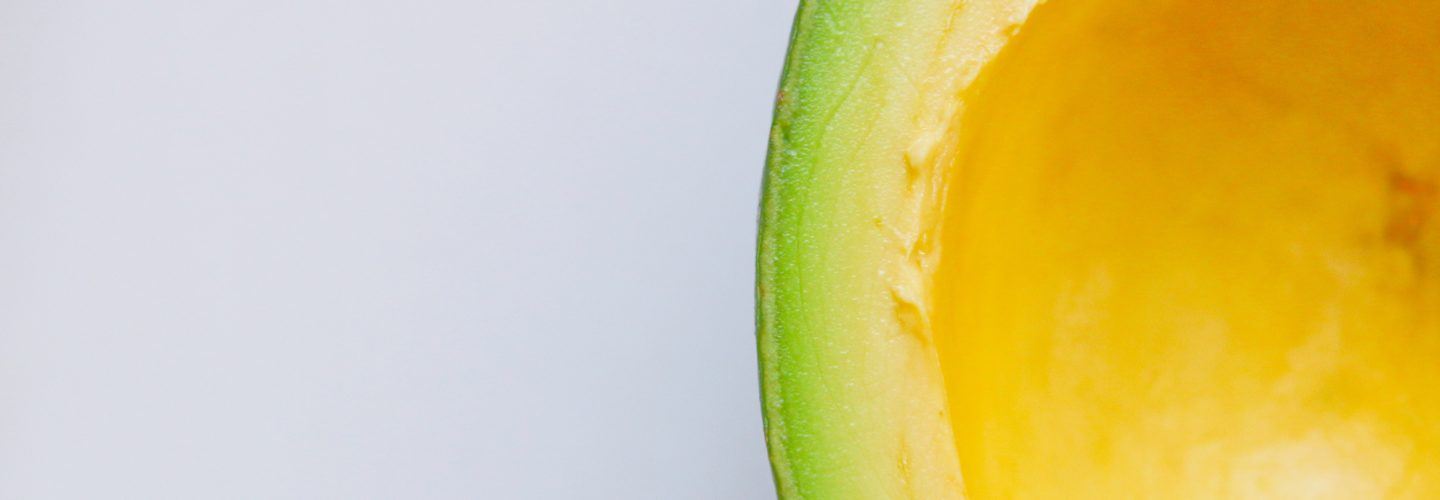
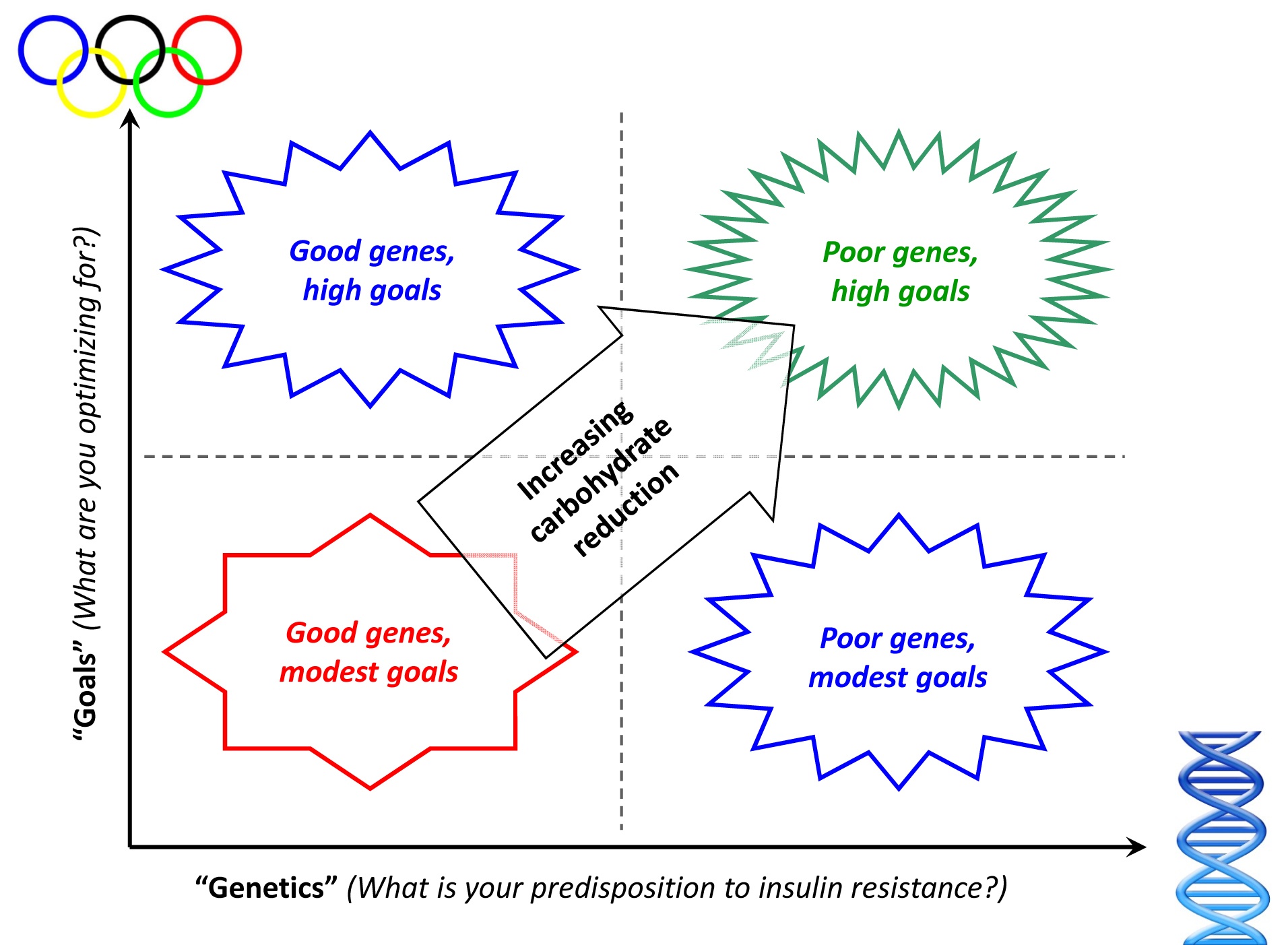

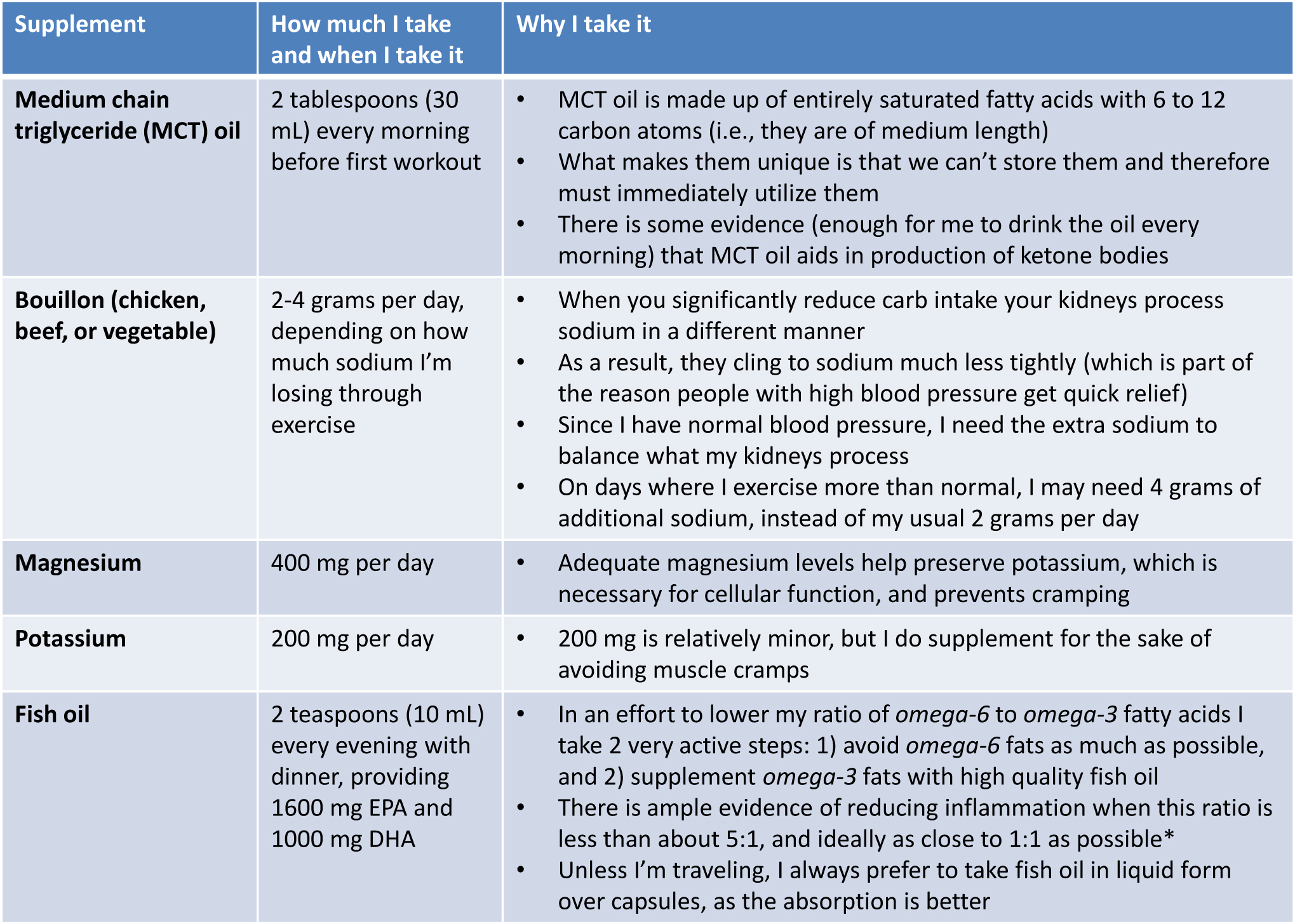

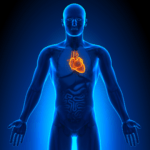
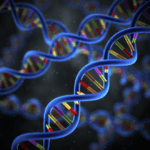
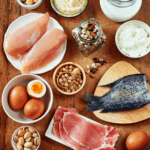
Hi Peter,
Any suggestion on how to make improvements on going to the bathroom?
I am not new to the low curb diet, but that issue always a big one for me.
I guess my body needs a lot of fiber to finish the job.
Thank you for your help.
Nope, not fiber. You need more salt and more oil in your diet. Supplemental fiber is actually harmful.
Thank you so much for this post and information. I am curious though in what way is fiber harmful? I have done low carb before only to “ease up” then next thing I know I am full blown addicted to carbs and sugar and feel miserable. I am resolved to stay in the low carb lifestyle but constipation is an issue. Why is fiber harmful?
Supplemental fiber probably exacerbates promotion of diverticular disease. The treatment for constipation is sufficient sodium, water, and oil.
Thank you.
I eat plenty of oil and salt – since I eat deli meat almost daily – and constipation is still the way it is. Perhaps some of us have permanent problems in this area – I had eating disorders for years, and perhaps this is the result: a “motility problem,” as one doctor termed it. I had no result after my colonoscopy prep, so… Anyway, it’s a problem. Eating more – enough to maintain a higher weight, and I’m not skinny at all – helps, so it’s a toss up.
Hmmm. Ask your doc about trying mineral oil.
Peter, Thank you for your help.
Can you please tell me how much oil and salt I need to eat every day to avoid constipation?
I am 5,8” and 240 LB my goal is to get to 180.
Thank you.
No magic number. You need to experiment with it. It’s highly dependent on your activity level and genetic factors.
Wow..I was literally going to post the question “Can you post your food log?”. This information is super invaluable. Thank you. I have a question.. I know you mentioned that you eat when you are hungry and don’t when you aren’t. Does time play a role at all? I keep reading about intermittent fasting and how good it is to try and consume your daily intake within a small shorter window leaving the larger share of your day fasting. I’m definitely not a calorie counter but I am concerned that grabbing a piece of salami at midnight will slow down my progress. What are your thoughts?
Thanks.
Oops…Sorry… I must have missed the similar question asked earlier.
Jordan, it might, but I have not looked into that with any great effort. Also, it may matter if you are in or not in ketosis. It’s hard for me to understand why there would be a value of doing this while already in ketosis, but possibly if you’re not. Bottom line, though, I don’t really know. Would need to see some data.
Great Blog! Its nice to find another low carber into endurance sports and with a medical background.
I have a couple questions for you after reading about what you eat. I have been low carb for about 8 years now, I also enjoy experimenting. I have never been over-weight, I went low carb because the evidence convinced me it was the correct way to eat. I have always felt that if I was on the correct diet I would not need supplements, I could get everything I need from my food. Do you think you would take so many suppliments if you did not excercise so much?
Another minor issue I have: I rely a lot on a really fatty soup my wife makes from chicken wings and thighs. It looks almost like lard until I heat it up. I have a cup of that a day. How do I figure out the fat content of it?
With all the blogs and books I have read over the years, I have never read anything about the lack of sodium issue, so I’ll have to do more research on that.
Thanks again.
Elton, glad you’re finding this helpful. I take the supplements I do because they help me perform better in day-to-day life, not just exercise. Some (sodium and magnesium) are essential, given my state of ketosis. Others, like MCT oil, just make me feel better overall. The soup sounds awesome. I’d love the recipe. The only accurate way to figure out the fat content would be to take it a lab where they can do calorimetry (basically, burn and measure heat produced), but I can’t imagine that information would be of value beyond curiosity.
Yes, But I am very curious person…
So I have been adding a teaspoon of bullion to my daily soup and I think its helping. My headaches have been absent recently. I did start taking magnesium and fish oil as a test, but I get really sick on the magnesium vitamins, which I found is a common side effect. Any advice on this? Eat more spinach :)?
Do you take bouillon when you travel?
I also noticed a lot of people commenting on you eating salami. I also eat salami almost daily (Salami with Cream Cheese, yum!). I get a Nitrate free brand online, but if I don’t have any on hand, I get a high quality brand from Safeway. I have been looking for good studies on whether nitrosamine does actually cause cancer in humans, but so far I haven’t found anything convincing. I also feel that the sodium nitrate protects me from food poisoning better. Also, vegetables contain just as much, if not more, sodium nitrate as Salami. And if you eat vegetables with a protein, they can combine to form nitrosamine. And beer is one of the highest sources of nitrosamine, but no one ever talks about that.
Have you studied the nitrosamine issue at all?
Peter,
I’ve hit my 2 week trial run. I’ve eliminated simple sugars and limited carbs to around 150g/day, most day less than that.
One concession I made was to be sure to have my energy drink during rides and a recovery drink post ride. I prefer GU drink.
It was not particularly hard for me to limit carbs to 150 or less a day.
The results have been pretty good. I lost about 1 lb but unscientifically I feel trimmer. My only issues were the first few days I got slightly light headed and just needed to eat something, usually almonds.
I haven’t noticed a performance decline although I’m in week 1 of a 3 week block of killer TT intervals so the results are not in yet.
I’ll continue with the low carb/no sugar diet for another 2 weeks and see what happens.
I definitely feel more full and get less extreme hunger cravings every day.
Your fat shake recipe is very similar to mine, except that I use a quarter cup of wild blueberries instead of strawberries, and I add two heaping tablespoons of flax seed meal. How do you feel about flax seed meal? Some say it’s as good as or better than fish oil when it comes to providing omega-3. Do you agree?
Flax seed his high linolenic acid (omeaga-3), but it has pretty poor conversion to EPA and DHA, relative to aquatic sources of omega-3. Hence, I prefer to get my n-3 through marine sources.
Dr Peter.
I notice you include in your diet processed meats, salami, pepperoni etc. In last weekends newspaper here in Australia it inlcuded an article on processed meats increasing the risk of pancreatic cancer. It was referring to a report out of Sweden (no refence or link to the actual report) warning of the overconsumption of processed meats due to being high in fat & salt (we can ignore those 2) as well as additives like nitrates for maintaining colour. What is your opinion on such matters and your take on the additives such as nitrates?
On a seperate and not so glamerous subject, I read a great paper debunking the myth that meat rots in your stomach/colon etc. It pointed the finger at vegetables, legumes etc that are the culprit to gas and presumably a sizable number 2. Did you notice any differences when you cut out the carbs etc in regards to number 2’s? It might be a bit personal to ask this question, but I have noticed a considerable difference and I put it down to the food I ingest (being full of the nutrients my body wants)being consumed by the body and I put less food (that the body doesn’t really want or can break down effectively)in that is likely to end up out as waste.
Maintain the rage.
Anthony – Brisbane, Australia
Anthony, when I buy meats like salami and pepperoni I tend to buy the ones with the least processing. That said, the studies that suggest the harm of these additive are not really constructed (at all, actually) to allow such conclusions. They are retrospective and observational. To be safe, I’m willing to play a bit of a premium to reduce them.
As far as gas and other gastrointestinal discomfort, I actually experienced and almost overnight difference when I stopped eating fruit and vegetables. I had spend my entire life thinking I was lactose intolerant. It was probably fructose and components of fiber that was killing my gut.
Hi Peter! I’ve been in ketosis for the past week and it feels fantastic!I took your advice and reduced the amount of protein I was eating.
I’m gearing up for a marathon in one month.
I started LC almost a month ago and my training has gotten much better! I’m between 10-15g of carbs. Do you have any tips on how to prepare food wise on the days leading up to the race? This is my first time running on LC and I’m a little nervous.:)
Thanks!
Ingrid, excellent news. If you are in ketosis there is no need to “carb load” to do anything like that. Just make sure you are appropriately hydrated, have plenty of sodium on board, and enough fat in the tank. You should be getting close to your final long run before your taper, so make sure you really experience some stressful conditions to mimic the demands.
Hi Peter, Hello Commenters,
I realize this is a very specific request but if you or anyone else frequenting this site knows about any blogs/insiders concerning LCHF and martial arts, the info would be greatly appreciated. There’s a lot out there concerning LCHF and endurance sports but I cannot seem to find any reputable info by googling this topic…Many thanks in advance!
Ingrid-
How long did it take you to adjust to diet as an endurance runner and when did fat lass begin? I have been at this a couple months and feel like I am getting heavier? Curious!
you’re right! my last long run IS this weekend. Thank you for the awesome advice! My goal is to run 3:10..my pr is 3:17. I think I can shave off the 7 minutes!
I’ll let you know how I do!
Thank you again!
Holy cow…3:10 is *movin’* Let us know how your last long training run goes this weekend. 1 gm of bouillon 2-3 hours before the run in 750 mL hot water.
will do!
hello peter!
So, I moved my long run to this morning because I’m running an 8k this weekend. I have to say thank you Peter for the great advice!
At 5:30am this morning I drank 750ml of bouillon. I didn’t plan on running until 8:30 so I went back to bed. What would you recommend on race day? I plan on taking a shuttle at 5:45am to the starting line and the race begins at 7:30am. do I have my bouillon at 4:30am?
This morning I ran 20 miles at 8:00 min/mile…45 seconds slower than my 7:15 pace for the marathon. I felt great! The bouillon really helped! It was also a bit warm out.
Last question, how would I up my fat without raising protein? I’m really finding it difficult when I consume a lot of fatty meat to keep my protein down. I love meat and i’m trying to stay below 100g of protein.
Thanks!
Look at what I eat and try to experiment. You can probably easily get to 1.5, if not 2 gm/kg/day.
Hi Peter! Well I ran the l.a.marathon this morning and I PR’d! I ran 3:07.40..10 minutes faster than my time last year. I did the same routine you told me…750ml of bouillon 3 hours before the race. I had a fatty meal the night before but not too fat. I also drank tons of water every day..pretty close to your gallon per day. I think that
saved me! Low carb made me feel lighter!
Thanks so much Peter for all that you do..:)
Holy cow, Ingrid! That is a remarkable time. I guess you’ll be at Boston next year? Great job and thanks for updating us.
Hi again Peter,
Are you aware of any effects that a high fat diet has on testosterone levels?
Best,
Kypros
I am not, but I am aware that low fat intake and, specifically, low cholesterol intake can lower testosterone levels. Of course, A LOT of things can lower testosterone levels, including over-training.
Peter,
Nice blog. Just wondering if you have come over any good remedy for ketosis inflicted bad breath. When I am in ketosis my breath is very bad. Also, I am super tired when I workout when I am in ketosis. I’ve upped my carb intake to about 100g/day and feel less tired during workouts. Being in ketosis and metabolic workouts have confused me. An article on workout and ketosis would be awesome.
Thanks,
Mark
Mark, I don’t seem to have much experience with that problem, except to note that after a few weeks (in most) it seems to go away. As for fatigue, I really went through this for a few weeks, also. I really need to ensure I was in ketosis (not just flirting with it), that I was getting sufficient minerals (sodium, magnesium, potassium are the most important), and that I was getting enough fat. These 3 things, coupled with patience, got me there. It really took me about 12 weeks to really adapt, though.
This is proving complicated indeed when dairy stops you from losing weight… yes I am one of those ones. Very hard to get enough fat, particularly with snacks.
Still, I am only a few days in and eating a lot more than I was when concentrating mostly on protein and not fat. I found that I could only lose weight consistently by reducing the amount I ate. Any extra meals etc would cause me to stop losing. However after 12 months I have lost 70lbs and only have another 30lbs to go.
Looking forward to the high fat change improving things.
Love your work Peter.
Great blog…you’ve re-inspired me (to make everyday low carb not just week days…the beer might be a test though!)
One thing that does concern me is the constant bad press for processed meats, and how they ’cause cancer’. Without any contrary advice, it does worry me slightly,as I eat alot of bacon/ham/sausage.
What do you think about this?
Ian, a lot of this bad press is really based on observational studies. I’ll be writing about this quite a bit in the future, so please stay tuned.
Hi Peter,
I assume when you say 2-4 g sodium that is what you mean, rather than 2-4 g “salt”. I’ve been having some tiredness issues & it looks like my sodium/salt levels have been too low, especially given the hot Adelaide summer, the amount I sweat & my exercise load.
Great blog.
Correct, I supplement my diet with 2 to 4 gm/day or sodium in the form of bouillon, so all in I consume 4 to 6 gm/day of sodium.
You state that you eat “zero starch”. John McDougall, MD, Santa Rosa, CA has a book to be published in May, The Starch Solution. He asserts: “The human diet is based on starches. The more rice, corn, potatoes, sweet potatoes, and beans you eat, the trimmer and healthier you will be — and with those same food choices you will help save the Planet Earth too.” In prior publications, he lists an extensive bibliography citing clinical studies and trials, peer reviewed articles, anthropological/historical evidence, etc., as well as anecdotal evidence of his many patients who achieved weight loss and healthier lipid and metabolic profiles by following his program. He espouses an essentially vegan diet replete with starches, which seems to be in diametric contradiction to your and Gary Taubes’s thinking and analysis. Could you please comment on this, or can we merely conclude that “different programs work for different people”, or that there is perhaps “junk science” associated with one or the other interpretation. Thank you very much.
Judy, great question. Dr. McDougall is a proponent of a body of research that is also supported by folks like Colin Campbell and Dean Ornish. I wrote a post about this topic (broadly) that I think you might find interesting: https://eatingacademy.com/nutrition/why-weight-watchers-is-actually-a-low-carb-diet
When you read this, focus on the quality of the “science” that supports this work. If you really have an interest in understanding this better, I would highly recommend you read Denise Minger’s work on this: https://rawfoodsos.com/2010/07/07/the-china-study-fact-or-fallac/ followed by https://rawfoodsos.com/2011/09/22/forks-over-knives-is-the-science-legit-a-review-and-critique/ followed by Mike Eades excellent work on this topic: https://www.proteinpower.com/drmike/cancer/the-china-study-vs-the-china-study/
I know what you’re thinking…geez, I ask a simple question and I get 2 hours worth of reading assignments! Unfortunately, if you really want to understand this issue, it requires being critical of the science. My last point is actually a bit of a correction to your point about these recommendations being diametrically opposite to what folks like me and Gary say: We ALL share the most important belief — there is ZERO role in human diet for sugars and highly refined grains/carbs. Again, this suggests they are probably the worst offending agents. Perhaps the individual difference we do are just that.
Final point: Here is the most *important* element of this discussion — how rigorous does the science need to be to based recommendations on it? Everything emerging from the work of McDougall and others is based on retrospective observations which show correlations, but which under no circumstance show, or even suggest, causation. Do how can we know?
Great thanks for your reply and the reading is well worth it. While it is true that you are all on the same page when it comes to sugars and refined carbohydrates, the amount of so called complex carbs (often also high glycemic as in white potatoes) that Dr. McDougall claims one can eat in any amount as long as no fat of any kind is paired with it would seem to have a deleterious effect on insulin secretion, ergo fat accumulation and metabolic syndrome. Yet presumably his patients achieve weight loss and improvements
in their metabolic profiles. What am I missing here?
Many, many thanks for your kind reply and for taking the time to maintain this blog.
Judy, it seems that some percentage of the populate is very tolerant of carbs, probably 10-20 or 10-30%. My wife is in this category, for example. The simple removal of the most “bad” dietary offenders does wonders for them (like everyone), but they can seem to tolerate modest amounts of glucose. Remember, 5 or 6 smokers do NOT die of lung cancer. It doesn’t mean smoking is “good for you.” Even when you strip out the folks that die prematurely of emphysema, heart disease, etc., it seems a non-trivial number of smokers do not suffer the ill-effects of tobacco.
To be clear (I hope everyone is reading this point!!!!): MY GOAL IS NOT TO GET EVERYONE TO EAT LIKE ME. MY GOAL IS TO GET FOLKS TO THINK CRITICALLY ABOUT WHAT THEY EAT, JUST AS THEY THINK CRITICALLY ABOUT OTHER HEALTH CHOICES THEY MAKE, SUCH AS SMOKING AND HEROIN USE.
Peter I have been trying to live this way I am 49 and 75 lbs over weight and I am so tired of being fat I am going to keep reading your blogs I hope I will be able to do this also. Thank you for your expertise.
Debbie, whether you’re 49 and 75 pounds overweight or 75 and 49 pounds overweight, it’s never too late to try something new, especially if what you’ve been doing to date isn’t working.
now that i’ve read some more of your blog all i can say is keep up the good work!
my son suggested i read taubes’ ‘gc,bc’ (very dense, almost scholarly)and afterwards i went on to his more accessible ‘wwgf’. both were eye-openers. from my teens i always struggled with my weight and was constantly discouraged by my doomed attempts to get rid of it and keep it off. i couldn’t figure it out-why others ate as much or more than me but stayed slender.
taubes’ proposal, as counter-intuitive as it strikes one, seems to come closest to a sort of unified field theory of obesity, in an occham’s razor way. that our own FDA has been _lying_ to us, pushing the food pyramid, is shocking. (what else are they not telling us.)
my history–i’m a mother of 5, all but one baby was over 10 lbs. my oldest, an ob/gyn, says that was a sign i was destined to develop diabetes, which i formally did a year ago (fasting blood sugar-129). now that i’ve been on a more or less low carb diet for a few months, blood sugar went down to 115 and i dropped 14 lbs with nothing more than normal hunger.
it doesn’t seem like much, but it’s a triumph for me given my previous failures. still a long way to go but now i have a road map.
4 of my kids still live with us and i’m the cook. taubes wrote of the likelihood that my big babies’ pancreases could be in overdrive, and i’ve warned them all of their legacy and need to exercise vigilance. i gave away all the carby food in my pantry and now prepare only low carb meals. it seems to be working out.
Great website! Can’t wait to see more. Thank you for doing this.
I am, however, completely confused on the protein issue. You say you aim for 2gm protein/kg (body weight, right?) – yet in your daily intake you’ve noted on one day, for example, a 12 oz steak after lots of dairy during the day, and of course, dairy has protein as well.
If I’m doing the math right, the 2gm/kg would equal about a 5 oz serving of protein (meat is what I’ve got in mind) a day.
What am I missing? What am I figuring wrong? Not that I’m going to mimic what you do – no way! I’m not that active. I’m trying to understand the concept, though. I think I’m eating far too much protein, but having a hard time finding what else to eat.
oh, also, if the kg does refer to body weight, is that current weight, or what you’re aiming for?
Thanks again.
I’m sorry, I hit send to soon! I meant to say that for me, that would be about 5 oz of protein, since I weigh just under 160, but even if you weigh 200 pounds, wouldn’t that be about 6 oz?
Yet 150 grams in equiv to…just about 6 oz, but given what you’ve logged for what you actually eat….I’m confused!
Thanks.
Kathy, an ounce of meat (or cheese or any piece of food) has a lot of water in it, too. So a 12 oz steak (if you eat a higher fat steak, like I do) might have only 60-75 gm of protein. So my protein consumption is, on average, about 120-150 gm/day.